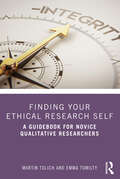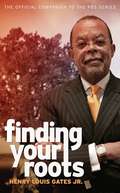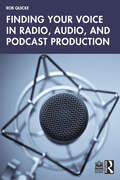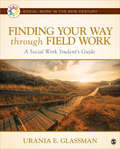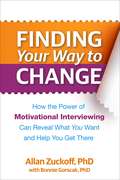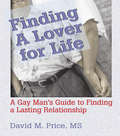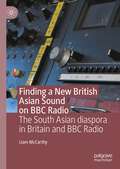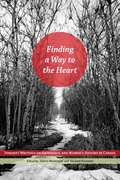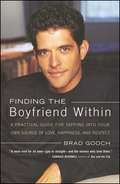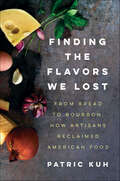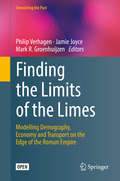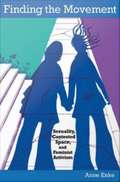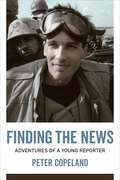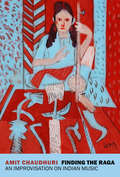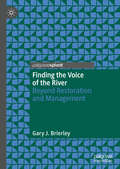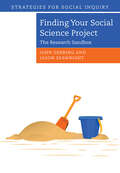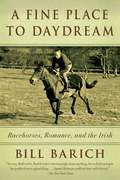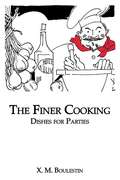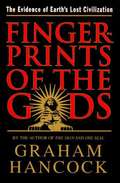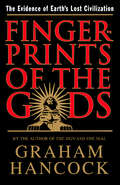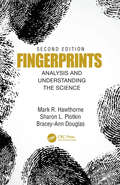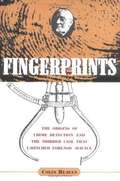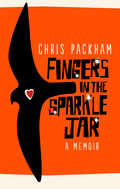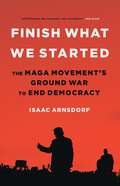- Table View
- List View
Finding Your Ethical Research Self: A Guidebook for Novice Qualitative Researchers
by Martin Tolich Emma TumiltyFinding Your Ethical Research Self introduces novice researchers to the need for ethical reflection in practice and gives them the confidence to use their knowledge and skill when, later as researchers, they are confronted by big ethical moments in the field. The 12 chapters build on each other, but not in a linear way. Core ethical concepts like consent and confidentiality once established in the early chapters are later challenged. The new focus becomes how to address qualitative research ethics when confidentiality and consent take on a limited form. This approach helps students understand that the application of concepts always requires thoughtful adaptation in different contexts and the book provides guidance on how to do this. Classroom/workbook exercises develop alternative solutions to create process consent, internal confidentiality, and engage reference groups, as examples. The first eight chapters allow students to develop their ethical research self before thinking through how they might address formal ethics review. Formal ethics review is deliberately not introduced until Chapter 9. Chapter 10 offers practical help to elements of review, before Chapter 11 emphasises the key message by providing examples of researchers' dilemmas in the field using vignettes and discussion. By providing these examples, students become aware that these can arise, explore how they might arise, and recognise how they might deal with them in the moment when they are unavoidable. With numerous examples of ethical dilemmas and issues and questions and exercises to encourage self-reflection, this reflexive, learn-by-doing model of research ethics will be highly useful to the novice researcher, undergraduate, and postgraduate research student.
Finding Your Roots
by Henry Louis Gates David AltshulerWho are we, and where do we come from? The fundamental drive to answer these questions is at the heart of Finding Your Roots, the companion book to the PBS documentary series seen by 30 million people. As Harvard scholar Henry Louis Gates Jr. shows us, the tools of cutting-edge genomics and deep genealogical research now allow us to learn more about our roots, looking further back in time than ever before. Gates's investigations take on the personal and genealogical histories of more than twenty luminaries, including United States Congressman John Lewis, actor Robert Downey Jr., CNN medical correspondent Sanjay Gupta, President of the "Becoming American Institute" Linda Chavez, and comedian Margaret Cho. Interwoven with their moving stories of immigration, assimilation, strife, and success, Gates provides practical information for amateur genealogists just beginning archival research on their own families' roots, and he details the advances in genetic research now available to the public. The result is an illuminating exploration of who we are, how we lost track of our roots, and how we can find them again.
Finding Your Voice in Radio, Audio, and Podcast Production
by Rob QuickeThis book provides a unique identity-centered approach to radio, audio, and podcast production which encourages readers to build their confidence and create audio content that matters to them. Written for those just starting out in audio production and focusing on the process of their self-development, readers will learn how to use sound to express themselves in a variety of ways and to create powerful stories in the process – all with the tools already available to them. At the centre of this approach is the author’s R.E.A.L. method, referring to the creation of audio that is relatable, engaging, authentic, and liberating. Students will learn to apply this concept to each step of the production process, from planning and writing through to interviewing, broadcasting, and responding to feedback. By the end of this book readers will have developed a working knowledge of podcast, audio, and radio production alongside their own means of self-expression. Supported by exercises and interviews with audio practitioners throughout, Finding Your Voice in Radio, Audio, and Podcast Production is a key resource for anyone approaching radio, audio, or podcasting for the first time. A supporting companion website with Instructor and Student Resources is available at www.robquicke.com.
Finding Your Way Through Field Work: A Social Work Student's Guide (Social Work in the New Century)
by Dr Urania E. GlassmanWritten from the perspective of long-standing field director Urania E. Glassman, Finding Your Way Through Field Work is a practical guide that helps BSW and first and second year MSW students successfully navigate field work. Vignettes, examples from field programs, and over 75 case illustrations further an applied understanding of every step in the field work process, highlighting student accomplishments, obstacles, and common dilemmas. Unique in its experiential approach, this applied text reinforces true learning in the field.
Finding Your Way Through Field Work: A Social Work Student's Guide (Social Work in the New Century)
by Dr Urania E. GlassmanWritten from the perspective of long-standing field director Urania E. Glassman, Finding Your Way Through Field Work is a practical guide that helps BSW and first and second year MSW students successfully navigate field work. Vignettes, examples from field programs, and over 75 case illustrations further an applied understanding of every step in the field work process, highlighting student accomplishments, obstacles, and common dilemmas. Unique in its experiential approach, this applied text reinforces true learning in the field.
Finding Your Way to Change
by Stephen Rollnick William R. Miller Bonnie Gorscak Allan ZuckoffAre you tired of being told by others--self-help books included--what you should do? Drs. Allan Zuckoff and Bonnie Gorscak understand. That's why this book is different. Whether it's breaking an unhealthy habit, pursuing that dream job, or ending harmful patterns in relationships, the key to moving ahead with your life lies in discovering what direction is truly right for you, and how you can get there. The proven counseling approach known as motivational interviewing (MI) can help. Drs. Zuckoff and Gorscak present powerful self-help strategies and practical tools that help you understand why you're stuck, break free of unhelpful pressure to change, and build confidence for developing a personal change plan. Vivid stories of five men and women confronting different types of challenges illustrate the techniques and accompany you on your journey. MI has a track record of helping people resolve long-standing dilemmas in a remarkably short time. Now you can try it for yourself--and unlock your own capacity for positive action.
Finding a Lover for Life: A Gay Man's Guide to Finding a Lasting Relationship
by David PriceDevelop healthy, lasting relationships!Here is a terrific dating guide for single gay and bisexual men. This insightful book provides a proven strategy for creating a satisfying dating life and finding a partner who is right for you! It integrates theory and practice to help you create and develop healthy relationships, guiding you through the process of dating and relationship formation. Finding a Lover for Life comes complete with thought-provoking worksheets that challenge myths, false beliefs, and incorrect assumptions about gay/bi men, dating, and relationships.Finding a Lover for Life will save you a great deal of time and frustration in developing dating skills. Its rational, skills-based strategic approach to dating will help you plan, organize, and focus your efforts in that part of your life. Finding a Lover for Life is the tool you need to plan and implement strategies that will: attract available dating partners eliminate problems by identifying compatible and noncompatible partners create a healthy relationshipIt also takes you through an individual preparation routine for dating that will help you to: challenge societal views of romance uncover self-defeating beliefs resolve past conflicts create affirming and self-enabling beliefsThis book will help you learn to date in a healthy and efficient way. But more than that, Finding a Lover for Life will help you develop a more positive self-concept, create a healthy community of friends, and help you move your life in a new, more constructive direction.
Finding a New British Asian Sound on BBC Radio: The South Asian diaspora in Britain and BBC Radio
by Liam McCarthyThis book explores the contrasting responses to the South Asian diaspora in Britain of BBC local radio and BBC network radio. It highlights the hidden history of how BBC local radio stations developed a schedule of five thousand hours a year of programmes targeted at South Asian communities in England. Local radio stations at the periphery of the BBC built deep and influential connections with marginalised Asian communities, creating the BBC Asian Network in 1989 and played an influential part in building local social cohesion. This contrasts with central BBC policy that reveals a management culture resistant to change and unable to embrace an increasingly diverse Britain - creating a problematic legacy for the BBC. Finding a New British Asian Sound brings new insights into current debates around policy and institutional racism at the BBC, where South Asian programming on local and network radio remains at risk of closure.
Finding a Way to the Heart: Feminist Writings on Aboriginal and Women's History in Canada
by Valerie J. Korinek Robin Jarvis BrownlieWhen Sylvia Van Kirk published her groundbreaking book, Many Tender Ties, in 1980, she revolutionized the historical understanding of the North American fur trade and introduced entirely new areas of inquiry in women’s, social, and Aboriginal history. Finding a Way to the Heart examines race, gender, identity, and colonization from the early nineteenth to the late twentieth century, and illustrates Van Kirk’s extensive influence on a generation of feminist scholarship.
Finding the Boyfriend Within: A Practical Guide for Tapping into your own Scource of Love, Happiness, and Respect
by Brad GoochIn the tradition of the perennial bestseller I'm OK, You're OK, noted author Brad Gooch offers single and coupled gay men a provocative, sophisticated, and inspirational guide that addresses the big issues of love, romance, and being alone. Part memoir, part self-help, Finding the Boyfriend Within is a remarkably practical and helpful guide in the quest for self-discovery for the thousands of gay men who despair of ever being in a committed relationship. Filled with anecdotes, romantic advice, problem-solving suggestions, and humor -- as well as wisdom from both the East and West -- Finding the Boyfriend Within offers simple self-awareness exercises to help discover the respect, happiness, and love that come first, and most enduringly, from within.
Finding the Flavors We Lost: From Bread to Bourbon, How Artisans Reclaimed American Food
by Patric KuhThe multiple-James Beard Award–winning restaurant critic for Los Angeles Magazine delivers an arresting exploration of our cultural demand for “artisanal” foods in a world dominated by corporate agribusiness.We hear the word “artisanal” all the time—attached to cheese, chocolate, coffee, even fast-food chain sandwiches—but what does it actually mean? We take “farm to table” and “handcrafted food” for granted now but how did we get here? In Finding the Flavors We Lost, acclaimed food writer Patric Kuh profiles major figures in the so-called “artisanal” food movement who brought exceptional taste back to food and inspired chefs and restaurateurs to redefine and rethink the way we eat.Kuh begins by narrating the entertaining stories of countercultural “radicals” who taught themselves the forgotten crafts of bread, cheese, and beer-making in reaction to the ever-present marketing of bland, mass-produced food, and how these people became the inspiration for today’s crop of young chefs and artisans. Finding the Flavors We Lost also analyzes how population growth, speedier transportation, and the societal shifts and economic progress of the twentieth century led to the rise of supermarkets and giant food corporations, which encouraged the general desire to swap effort and quality for convenience and quantity.Kuh examines how a rediscovery of the value of craft and individual effort has fueled today’s popularity and appreciation for artisanal food and the transformations this has effected on both the restaurant menu and the dinner table. Throughout the book, he raises a host of critical questions. How big of an operation is too big for a food company to still call themselves “artisanal”? Does the high cost of handcrafted goods unintentionally make them unaffordable for many Americans? Does technological progress have to quash flavor? Eye-opening, informative, and entertaining, Finding the Flavors We Lost is a fresh look into the culture of artisan food as we know it today—and what its future may be.
Finding the Limits of the Limes: Modelling Demography, Economy and Transport on the Edge of the Roman Empire (Computational Social Sciences)
by Philip Verhagen Jamie Joyce Mark R. GroenhuijzenThis open access book demonstrates the application of simulation modelling and network analysis techniques in the field of Roman studies. It summarizes and discusses the results of a 5-year research project carried out by the editors that aimed to apply spatial dynamical modelling to reconstruct and understand the socio-economic development of the Dutch part of the Roman frontier (limes) zone, in particular the agrarian economy and the related development of settlement patterns and transport networks in the area. The project papers are accompanied by invited chapters presenting case studies and reflections from other parts of the Roman Empire focusing on the themes of subsistence economy, demography, transport and mobility, and socio-economic networks in the Roman period.The book shows the added value of state-of-the-art computer modelling techniques and bridges computational and conventional approaches. Topics that will be of particular interest to archaeologists are the question of (forced) surplus production, the demographic and economic effects of the Roman occupation on the local population, and the structuring of transport networks and settlement patterns. For modellers, issues of sensitivity analysis and validation of modelling results are specifically addressed. This book will appeal to students and researchers working in the computational humanities and social sciences, in particular, archaeology and ancient history.
Finding the Movement: Sexuality, Contested Space, and Feminist Activism
by Anne EnkeIn Finding the Movement, Anne Enke reveals that diverse women's engagement with public spaces gave rise to and profoundly shaped second-wave feminism. Focusing on women's activism in Detroit, Chicago, and Minneapolis-St. Paul during the 1960s and 1970s, Enke describes how women across race and class created a massive groundswell of feminist activism by directly intervening in the urban landscape. They secured illicit meeting spaces and gained access to public athletic fields. They fought to open bars to women and abolish gendered dress codes and prohibitions against lesbian congregation. They created alternative spaces, such as coffeehouses, where women could socialize and organize. They opened women-oriented bookstores, restaurants, cafes, and clubs, and they took it upon themselves to establish women's shelters, health clinics, and credit unions in order to support women's bodily autonomy. By considering the development of feminism through an analysis of public space, Enke expands and revises the historiography of second-wave feminism. She suggests that the movement was so widespread because it was built by people who did not identify themselves as feminists as well as by those who did. Her focus on claims to public space helps to explain why sexuality, lesbianism, and gender expression were so central to feminist activism. Her spatial analysis also sheds light on hierarchies within the movement. As women turned commercial, civic, and institutional spaces into sites of activism, they produced, as well as resisted, exclusionary dynamics.
Finding the News: Adventures of a Young Reporter
by Peter CopelandFinding the News tells Peter Copeland’s fast-paced story of becoming a distinguished journalist. Starting in Chicago as a night police reporter, Copeland went on to work as a war correspondent in Latin America, the Middle East, and Africa before covering national politics in Washington, DC, where he rose to be bureau chief of the E. W. Scripps Company. The lessons he learned about accuracy and fairness during his long career are especially relevant today, given widespread concerns about the performance of the media, potential bias, and the proliferation of so-called “fake news.” He offers an honest and revealing narrative, told with surprising humor, about how he learned the craft of news reporting.Copeland’s story begins in 1980, when a colleague hastily declared him a full-fledged reporter after barely four days of training. He went on to learn the business the old-fashioned way: by chasing the news in thirty countries and across five continents. As a young person entering journalism and reporting during some of recent history’s most fraught military situations— including Operation Desert Storm and the US invasions of Panama and Somalia—Copeland discovered the craft was his calling. Looking back on his career, Copeland asserts his most important lessons were not about reporting, writing, or the latest technologies, but about the core values that underlie quality journalism: accuracy, fairness, and speed. Replete with behind-the-scenes stories about learning the trade, Copeland’s inspiring account builds into a heartfelt defense of journalism “done the right way” and serves as a call to action for today’s reporters. The values he learned as a cub reporter are needed now more than ever, he argues, as the integrity and motives of even seasoned journalists are called into question by political partisans. Copeland admits that those critics are not entirely wrong but contends that exciting new technologies, combined with a return to old-school news values, could usher in a golden age of journalism.
Finding the Raga: An Improvisation on Indian Music
by Amit ChaudhuriAn autobiographical exploration of the role and meaning of music in our world by one of India's greatest living authors, himself a vocalist and performer.Amit Chaudhuri, novelist, critic, and essayist, is also a musician, trained in the Indian classical vocal tradition but equally fluent as a guitarist and singer in the American folk music style, who has recorded his experimental compositions extensively and performed around the world. A turning point in his life took place when, as a lonely teenager living in a high-rise in Bombay, far from his family&’s native Calcutta, he began, contrary to all his prior inclinations, to study Indian classical music. Finding the Raga chronicles that transformation and how it has continued to affect and transform not only how Chaudhuri listens to and makes music but how he listens to and thinks about the world at large. Offering a highly personal introduction to Indian music, the book is also a meditation on the differences between Indian and Western music and art-making as well as the ways they converge in a modernism that Chaudhuri reframes not as a twentieth-century Western art movement but as a fundamental mode of aesthetic response, at once immemorial and extraterritorial. Finding the Raga combines memoir, practical and cultural criticism, and philosophical reflection with the same individuality and flair that Chaudhuri demonstrates throughout a uniquely wide-ranging, challenging, and enthralling body of work.
Finding the Voice of the River: Beyond Restoration and Management
by Gary J. BrierleyThis book addresses societal relationships to river systems, highlighting many unexplored possibilities in how we know and manage our rivers. Brierley contends that although we have good scientific understanding of rivers, with remarkable prospect for profound improvements to river condition, management applications greatly under-deliver. He conceptualizes approaches to river repair in two very different ways: Medean (competitive) and Gaian (cooperative). Rather than ‘managing’ rivers to achieve particular anthropogenic goals (the former option), this book adopts a more-than-human approach to ‘living with living rivers’ (the latter option), applying a river rights framework that conceptualizes rivers as sentient entities.Chapters build on significant experience across many parts of the world, emphasizing the diverse array of river attributes and relationships to be protected and the wide range of problems to be addressed. Although the book has an environmental focus, it is framed as an argument in popular philosophy, contemplating the agency of rivers as place-beings. It will be of great value to academics, students and general readers interested in protecting river systems.
Finding your Social Science Project: The Research Sandbox (Strategies for Social Inquiry)
by John Gerring Jason SeawrightThe most important step in social science research is the first step – finding a topic. Unfortunately, little guidance on this crucial and difficult challenge is available. Methodological studies and courses tend to focus on theory testing rather than theory generation. This book aims to redress that imbalance. The first part of the book offers an overview of the book's central concerns. How do social scientists arrive at ideas for their work? What are the different ways in which a study can contribute to knowledge in a field? The second part of the book offers suggestions about how to think creatively, including general strategies for finding a topic and heuristics for discovery. The third part of the book shows how data exploration may assist in generating theories and hypotheses. The fourth part of the book offers suggestions about how to fashion disparate ideas into a theory.
Fine Place to Daydream: Racehorses, Romance, and the Irish
by Bill BarichTwenty-five years after his racetrack classic Laughing in the Hills, Bill Barich tells the story of how he fell in love and found a new life in Dublin, where he was soon caught up in the Irish obsession with horses and luck. Barich travels throughout his adopted country and meets the leading trainers and jockeys, the beleaguered bookies who work rain or shine, and a host of passionate, like-minded fans--from Father Sean Breen, the "Racing Priest,” to T. P. Reilly, whose peculiar betting system turns on a horse’s looks. Witty, philosophical, and vividly written, A Fine Place to Daydream is a paean to the real Ireland, a moving tale of a surprise romance, and a thrilling account of a hugely exciting season at the track. "Captivating. . . . Mr. Barich recaptures much of the feel and compass of his first narrative of the equine life, once again weaving a broad tartan from scores of interviews with inhabitants of every corner of the horseracing industry. ” --The Wall Street Journal
Finer Cooking: Dishes For
by BoulestinFirst published in 2006. Routledge is an imprint of Taylor & Francis, an informa company.
Fingerprints of the Gods: The Evidence of Earth's Lost Civilization
by Graham HancockOn the great mysteries of nature, history, and man.
Fingerprints of the Gods: The Quest for Earth's Lost Civilization
by Graham HancockCould the story of mankind be far older than we have previously believed? Using tools as varied as archaeo-astronomy, geology, and computer analysis of ancient myths, Graham Hancock presents a compelling case to suggest that it is.Graham Hancock is featured in the popular Ancient Apocalypse, a Netflix original docuseries."Hancock structure his arguments through the scientific method. . . . He's asking the right questions. . . . If it's true, then it can significantly change the course of history and our understanding of our civilisations." —MediumIn Fingerprints of the Gods, Hancock embarks on a worldwide quest to put together all the pieces of the vast and fascinating jigsaw of mankind's hidden past. In ancient monuments as far apart as Egypt's Great Sphinx, the strange Andean ruins of Tiahuanaco, and Mexico's awe-inspiring Temples of the Sun and Moon, he reveals not only the clear fingerprints of an as-yet-unidentified civilization of remote antiquity, but also startling evidence of its vast sophistication, technological advancement, and evolved scientific knowledge.A record-breaking #1 bestseller in Britain, Fingerprints of the Gods contains the makings of an intellectual revolution, a dramatic and irreversible change in the way that we understand out past—and so our future.And Fingerprints of the Gods tells us something more. As we recover the truth about prehistory, and discover the real meaning of ancient myths and monuments, it becomes apparent that a warning has been handed down to us, a warning of terrible cataclysm that afflicts the Earth in great cycles at irregular intervals of time—a cataclysm that may be about to recur.
Fingerprints: Analysis and Understanding the Science
by Mark R. Hawthorne Sharon L. Plotkin Bracey-Ann DouglasFingerprints: Analysis and Understanding the Science, Second Edition is a thorough update of Mark Hawthorne’s classic written by two professionals with combined experience not only in crime scene investigations but also as court-recognized experts in latent print examination. Designed as a concise text to cover the fundamental techniques and principles of obtaining and analyzing latent fingerprint evidence, the book is laid out and written in an easy to understand format for those front-line professionals collecting and analyzing fingerprint evidence. Over time, the degree of sophistication and education on fingerprints and friction ridge analysis has increased. Ultimately, through scientific study by pioneers in the field, the composition of friction skin soon became evident: that it could be used as a unique identifier of individuals. Now, fingerprints and footprints as unique identifiers—and their use in criminal cases—have become commonplace and an essential component of criminal investigation with most cases involving some component of fingerprint evidence. Divided into two parts, the book begins with the basics of analysis, providing a brief history, systematic methods of identification, fingerprint pattern types and their associated terminologies and current classifications. The second part of the book discusses the identification and presentation of evidence in the courtroom, demonstrating both the traditional, manual method of lifting prints and the newer techniques for automated and live scans. Coverage provides instruction on searching and developing latent prints, storage, and comparison of prints. New to this edition are updated techniques on collecting and preserving fingerprint evidence—including packaging and maintaining chain of custody. More detailed documentation processes, and additional chemical and lifting techniques, are described including use of light sources, latent backing cards and lifting material, casting material, ten print cards, and the enhancement of prints in blood. A discussion of laboratory equipment and comparison tools, the addition of photography techniques, and recent courtroom challenges to fingerprint evidence is also presented. Fingerprints, Second Edition will provide a hands-on, fresh look at the most commonly utilized evidence found at crime scenes: fingerprints. The book will provide law enforcement, crime scene personnel and students just such an opportunity to easily understand and grasp the concepts, and relevant issues, associated with friction skin and fingerprint evidence.
Fingerprints: The Origins of Crime Detection and the Murder Case that Launched Forensic Science
by Colin BeavanHistory of how fingerprints came to be studied and used in forensics.
Fingers in the Sparkle Jar: A Memoir
by Chris PackhamVoted the UK’s Favourite Nature BookThe memoir that inspired Chris Packham's BBC documentary, Asperger’s and MeEvery minute was magical, every single thing it did was fascinating and everything it didn't do was equally wondrous, and to be sat there, with a Kestrel, a real live Kestrel, my own real live Kestrel on my wrist! I felt like I'd climbed through a hole in heaven's fence.An introverted, unusual young boy, isolated by his obsessions and a loner at school, Chris Packham only felt at ease in the fields and woods around his suburban home. But when he stole a young Kestrel from its nest, he was about to embark on a friendship that would teach him what it meant to love, and that would change him forever. In his rich, lyrical and emotionally exposing memoir, Chris brings to life his childhood in the 70s, from his bedroom bursting with fox skulls, birds' eggs and sweaty jam jars, to his feral adventures. But pervading his story is the search for freedom, meaning and acceptance in a world that didn’t understand him.Beautifully wrought, this coming-of-age memoir will be unlike any you've ever read.
Finish What We Started: The MAGA Movement's Ground War to End Democracy
by Isaac Arnsdorf"Entertaining, enlightening and disturbing." - Ira GlassThe immersive, captivating untold story of the mass radicalization of the Republican Party in the aftermath of January 6, 2021, entrenching the political power of a radical right-wing movement dedicated to dismantling democracy itself. Inspired by Donald Trump&’s election lies, a growing movement of grassroots activists mobilized around the country to pick up where the insurrection left off, laying the groundwork to succeed next time where Trump had failed to keep himself in power. But their own success in taking over and purging the Republican Party became their undoing as it drove away moderates and supplied the Democrats with a winning message in the 2022 midterms. Still, the MAGA Republicans proved uninterested in learning from that defeat, only becoming more extreme, divisive, and dead set on returning Trump to power. Washington Post national political reporter Isaac Arnsdorf has spent years at the forefront of reporting on this growing movement. Drawing on extensive, exclusive on-the-ground reporting around the country, and deepened by historical context, Arnsdorf has produced the defining journalistic account of the origins, evolution and future of the MAGA movement. Combining critical and rigorous reporting with the intimacy and complexity of a novel, this book is unlike any other in the decade since Donald Trump convulsed and transformed American politics. Finish What We Started tells the story of the ordinary Americans driving this change, who they are and where they came from, what motivates them, and what their movement means for the survival of American democracy.
